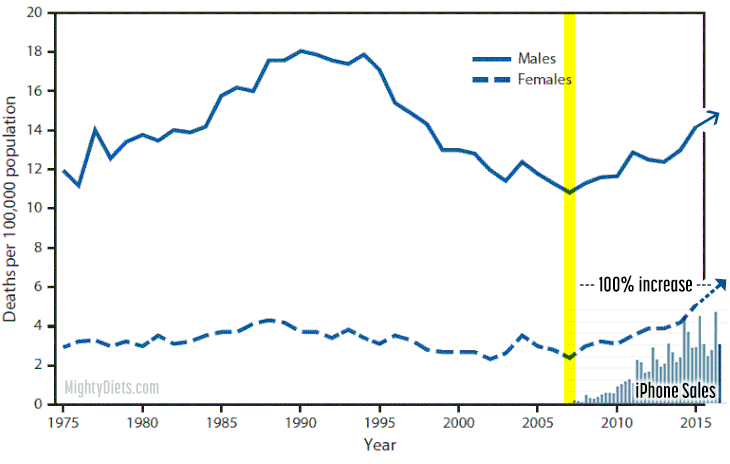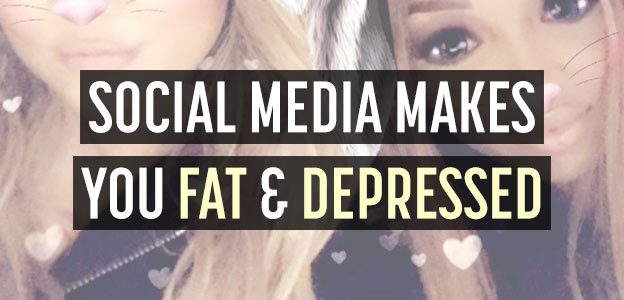Social media is bad for your health: OK, I know you’ve already heard about the dangers of social media, but it’s important to keep the conversation going. I mean, it took a long time for people to understand how bad smoking cigarettes was for their health and do something about it. That’s because corporations spent billions of dollars convincing people that smoking was cool, and even healthy. (The addictive chemicals helped too)
When there are billions of dollars of profit at stake, we have a history of doing what’s profitable instead of what’s right.
Well, you could argue that social media is just as addictive and bad for your health as smoking. However, unlike cigarettes, there’s no warning label on cell phones telling you about the potential dangers.
Before we discuss why social media is unhealthy, here’s a summary of social media’s proven side effects:
- Social media is addictive
- Social media makes you depressed
- Social media gives you anxiety
- Suicide rates in teens have doubled since the first iPhone release (2007)
- Obesity rates keep rising
- The Kardashians are multiplying
Ok, got it? Now, here’s how social media makes you fat and unhappy:
1.) Social Media Causes Cravings
Scrolling through ads, photos, and posts on social media encourages cravings, and that can lead to an unhealthy consumption.
Did you know that advertisers spend more than $40 billion per year advertising on social media? Most of these ads are designed to cause cravings by making you feel incomplete and unsatisfied. (*Like Weight Watchers Online: 50% Off!)
But, social media is all about sharing, and sharing is good, right? Well, it’s all this “sharing” that’s making us unhappy, and ultimately unhealthy.
Some examples of “sharing” on social media:
- A skinny friend posts photos of her euphoric and attractive family on vacation (I wish my family looked like that!)
- A friend posts pictures of their amazing dinner at a fancy restaurant (I want to eat that!)
- Scrolling through Facebook & Instagram photos envying other people’s lives (I want that!)
- Following celebrities, who look so beautiful and happy (I wish I was famous!)
Hmmm… What would someone wise, like Buddha, say about all this? Glad you asked!
“The basic cause of suffering is attachment to the desire to have (craving) and the desire not to have (aversion)” – Buddha
I find it ironic that social media’s central value (craving) is what Buddha concluded was the cause of all suffering. Oops!
Or, for all the Christians out there, consider the seven deadly sins: lust, gluttony, greed, sloth, wrath, envy, and pride. That sounds like an average day on Snapchat to me!
2.) Social Media = Depression = Weight Gain

Depression is closely related to both suicide and weight gain. I thought it would be interesting to overlay a chart of annual teen suicides with a chart of iPhone sales to show how the two are related. (above) As you can see, the rate of female teen suicide has doubled since the release of the iPhone.
*This alarming increase in suicide also contradicts the expected trend which is that suicide rates historically decrease in an improving economy. During the 11 years since the release of the iPhone, the stock market has more than doubled in value, while suicide rates have increased dramatically.
So, how does social media make you depressed? People tend to enviously compare their lives to those of others, who seem happier. These “social comparisons” make us feel depressed, as we start to wish our lives were different and better.
We can also become depressed if something hurtful happens on social media, such as being laughed at, bullied, or feeling left out of “real world” social events that we weren’t invited.
A 2010 study from Archives of General Psychiatry concluded that depression leads to an increased risk of obesity, largely because of the lack of motivation and energy that results from being depressed, as well as “emotional eating.”
Weight gain is a common side effect of both depressions itself and of the antidepressants used to treat it. That means depression can be a double-whammy for your weight and physical health.
Another way that you become depressed is that the hours spent on social media make you distracted and have a negative impact on the rest of your life. Social media addiction can cause you to define yourself in a negative and unhealthy way, largely based on “likes” and the unfiltered opinions of your “friends.” News and discussions of topics like politics can quickly lead to frustration, anger, and depression as well.
Our relationship with Russia has NEVER been worse thanks to many years of U.S. foolishness and stupidity and now, the Rigged Witch Hunt!
— Donald J. Trump (@realDonaldTrump) July 16, 2018
3. Social Media Affects Exercise & Sleep
This may seem like an obvious one, but consider that the average internet user now spends over 2 hours per day on social media like Facebook, Snapchat, and Instagram. That doesn’t even include all the other time we spend online, including texting, which adds up to over 5 hours each day!
It doesn’t take a mathematician to realize that those hours on social media and devices are being stolen from the rest of the day, and as a result, we get less exercise. You also might find yourself distracted during meals, plus drinking more alcohol more as your level of stress increases (aka “nervous eating”) because of the negative effects of social media.
Plus, all of that blue light from screens is bad for your health and disrupts the natural circadian rhythms of your body which can affect your sleep, encouraging a host of health problems like diabetes, heart disease, and obesity. Don’t even get me started on the habit of sleeping with your phone under your pillow, as many teens do!
Warning: Social Media Can Make You Depressed and Overweight!
So, why is that? Social media encourages cravings, which result in consumption as we chase elusive happiness. The more time we spend on social media, the more personal information we volunteer. This allows their software to better understand us so that this information can be used to feed us more of what we want.
This is bad for our mental and physical health but good for profits.
If you ask me, social media is just empty calories, which leads to depression and obesity!
*Related: 21 Funny Quotes About Weight Loss
What Should You Do?
Social media isn’t always bad. We just have a bad habit of following friends and celebrities who aren’t a positive influence.
So, one way to make your social media “feed” (ironic name!) healthier is to follow one or more social influencers who promote healthy living. There are lots of people to follow who share healthy recipes, motivational quotes, tips, and workouts that can inspire you to be healthier, and spend less time scrolling through the junk. Here are some suggestions:
- Best Healthy Eating Instagram Accounts – Vogue.co.uk
- Best fitness instagram accounts – BusinessInsider.com
- WeightWatchers Point System

